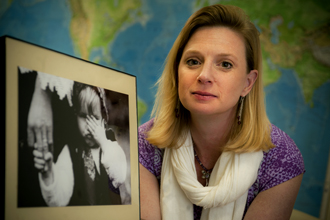Childhood Neglect Harms DNA
Extreme stress and neglect in childhood can damage DNA, potentially stealing time from a child's biological clock, according to a Tulane study of children who grew up in a Romanian orphanage, says child psychiatrist Stacy Drury.

Traumatic experiences in childhood are linked to changes in cells' “biological clock,” says child psychiatrist Stacy Drury. (Photo by Paula Burch-Celentano)
The study, which appeared recently in the journal Molecular Psychiatry, is the first to link traumatic childhood experiences with shortened telomere lengths, a biological marker of aging, says Drury, an assistant professor of psychiatry at the Tulane University School of Medicine who is lead author of the journal article. Telomeres are a region at the end of chromosomes that naturally shorten with age as cells divide and replicate.
“They are the biological clock of the cell,” Drury explains.
The length of the telomere dictates when a cell fully develops. When the length gets too short, it tells a cell when to die. Shorter telomere lengths in adults are associated with higher risks for cardiovascular disease, cognitive decline, diabetes and mental illness.
Drury and colleagues looked at 136 children in the Bucharest Early Intervention Project, a longitudinal clinical trial of foster care children aged 6 to 30 months. They found that the more time a child younger than five years spent in group institutional care where the child experienced emotional and physical neglect, the shorter the child's telomere length during middle childhood.
Telomere length may be the first sign of how early negative experiences change a child's biology, Drury says.
“Seeing these changes in young children highlights the critical importance of early intervention and improved care giving in our youngest and most vulnerable children,” she says.
Members of the psychiatry and community health sciences departments at Tulane conducted the study with researchers from Harvard University, Harvard School of Public Health and the University of Maryland.
Drury and colleagues plan a follow-up study to see whether the cellular changes are lasting. Researchers will examine whether improved care in later childhood slows or reverses the rate of telomere decline in study participants.
